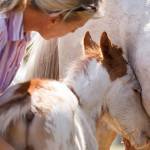Foal Health: Colostrum and Immunoglobulins

Once a foal is born, the placenta passed, and the chorus of oohs and ahs have quieted, the next step is to ensure the foal ingests sufficient colostrum, which contains infection-fighting proteins called immunoglobulins. While immunoglobulin G (IgG) has been considered the most important component in colostrum in the past, some experts suggest that immunoglobulin A (IgA) actually reigns supreme.* In fact, IgA is the most abundant immunoglobulin in milk, not IgG.
Foals absorb both IgG and IgA from colostrum during the first 24 hours of life. After absorption from the gastrointestinal tract, the IgG molecules circulate in the bloodstream to fight disease-causing organisms called pathogens. In contrast, IgA molecules congregate in mucosal membranes, areas of the body that form a barrier between the outside world and the body, such as the lining of the oral cavity, the nasal passages, and the layer of cells lining the intestinal tract. IgA is therefore described as playing a role in “mucosal immunity.”
“Many pathogens attack foals through respiratory and gastrointestinal mucosa. Up to half of all foals suffer from diarrhea at some point in their lives prior to weaning. IgA helps block the ability of those pathogens to attach to mucosal surfaces and invade the foal’s body,” said Kathleen Crandell, Ph.D., a nutritionist for Kentucky Equine Research.
After the first day or so of a foal’s life, neither IgG nor IgA can be absorbed from the gastrointestinal tract into the bloodstream.
“If the foal does not ingest sufficient levels of either IgG or IgA in the first day of life, they are at risk for infection until their own immune systems can produce immunoglobulins, a process that takes about three weeks,” explained Crandell.
To ensure foals ingest high-quality colostrum that contains sufficient IgG and IgA, follow these management strategies:
- During their last trimester of pregnancy, mares should be fed a balanced diet, complete with key nutrients for the developing fetus;
- Supplement mares with fish oil, as omega-3 fatty acids boost colostrum quality;
- Stay with foals until they have definitely nursed from their dams, preferably from both teats;
- Intervene promptly to find alternative sources of colostrum or milk if the foal did not nurse; and
- Enlist a veterinarian to pull blood to check for immunoglobulin levels if there is any doubt the foal received sufficient colostrum.
“In addition, consider offering broodmares Nano-E, a water-soluble form of natural vitamin E,” Crandell advised. “This vitamin has been found to improve circulating immunoglobin levels in the mare and pre-suckle levels in the colostrum.”
*Riley, C.B., C.J. Jenvey, F.J. Baker, and A. Corripio. 2020. A pilot study to investigate the measurement of immunoglobulin A in Welsh Cob and Welsh Pony foals’ faeces and their dam’s milk. New Zealand Veterinary Journal 68(4):225-230.








